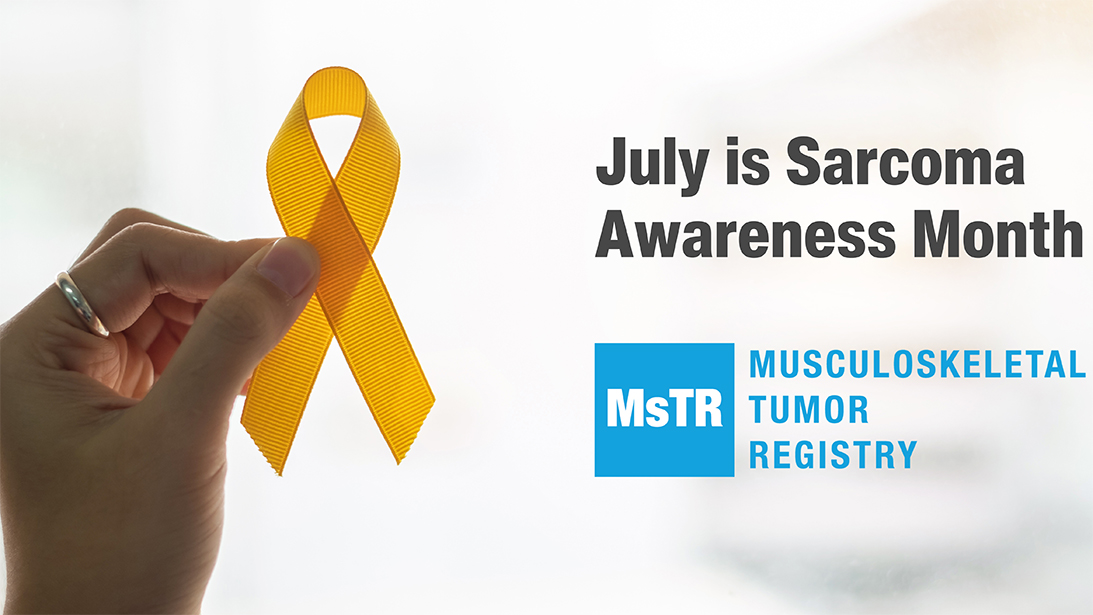
July marks Sarcoma Awareness Month, established to build awareness about this rare type of cancer. For individuals living with and treating sarcomas, increasing awareness about these rare cancers is extremely important. Although uncommon among adults (1 percent of adult cancers), sarcomas are more prevalent in children, accounting for about 15 to 20 percent of all childhood cancers. Because of the rarity of the disease, data tend to be scarce, as are answers to clinician and patient questions.
To help fill that void and engage the musculoskeletal community to advance knowledge and improve health, as outlined in the AAOS Strategic Plan, AAOS partnered with the Musculoskeletal Tumor Society (MSTS) to create the Musculoskeletal Tumor Registry (MsTR). Created in 2018, MsTR became a full registry in 2019, collecting data on orthopaedic bone tumors from eight participating institutions. The registry is led by orthopaedic oncology physicians who are members of both AAOS and MSTS.
“As a specialty, orthopaedic oncology is small; however, it is a group of hardworking, compassionate individuals who are dedicated to the field and promoting it,” said Kerri Mink, executive director of MSTS. “The registry will help propel data-driven decisions and outline benchmarks to determine how we can improve. That is why our partnership with AAOS is so important and why we continue to bring the MsTR to the forefront of our members.”
The goal of the MsTR is to provide a centralized record of patient, tumor, treatment, and outcomes data on sarcomas in the pelvis, spine, and extremities. Four pillars drive the registry:
- record research-quality data
- make data collection as small a burden as possible for surgeons
- be inclusive to all members of AAOS and MSTS
- make the infrastructure flexible for future changes
The MsTR is currently in its data-validation stage to ensure accuracy, which will take another year or two before data can be reported.
“The near-term goal is to recruit more sites that will contribute enough patients so we can start to comment on questions with short-term endpoints, like practice patterns or wound-healing complications,” said Benjamin J. Miller, MD, FAAOS, chair of the MsTR Steering Committee and president of MSTS. “For instance, we are collecting the details surrounding diagnostic biopsies, which are not easily found in electronic health records. This is an important area of quality improvement, as 10 to 20 percent of soft-tissue sarcomas are inappropriately treated with attempted resections prior to referral. Additionally, early on, we will be able to report on some short-term complications, such as early readmissions and return to the operating room.”
To give a voice to patients, the registry formed the MsTR Patient Caregiver Committee (PCC), which consists of patients and family members affected by sarcoma. The PCC will help orthopaedic oncologists understand what questions to ask their patients, how their quality of life is impacted by sarcoma, and ways to work together to monitor outcomes more effectively.
“As surgeons, we may believe that we know what is most important to our patients, but our patients may have completely different ideas,” Dr. Miller said. “We recognize that we should not just assume that we know the daily struggles of someone going through sarcoma treatment and later living with the consequences of that treatment. Guiding us to ask the right questions is one area where the PCC will be extremely valuable and help us as we grow and refine the registry.”
AI advancing sarcoma research
Artificial intelligence (AI) is being used in sarcoma research to advance orthopaedic disciplines, particularly musculoskeletal radiology and joint reconstruction. Researchers are experimenting with machine learning (ML) to understand how certain tumors behave and how interventions work against those tumors. Those working with metastatic sarcomas are using ML to determine which patients should be treated more or less aggressively, as well as survival predictors.
Dr. Miller explained, “Looking to the future of the registry, we could use this type of technology to determine a patient’s likelihood of fracturing a bone affected by metastatic cancer and an accurate prediction of survival as we are contemplating operative intervention. It would be very beneficial for a surgeon trying to determine the best treatment and in counseling patients. While that is many steps away, it would certainly be an area we could investigate and potentially add to the registry. Additionally, natural language processing could use discussions at a clinic visit to populate the data points of the registry and save time for busy clinicians.”
To provide further education on AI/ML, MSTS, in collaboration with the Musculoskeletal Oncology Research Institute, will hold an introductory session in musculoskeletal oncology during the MSTS Annual Meeting in Chicago on Sept. 11.
MSTS’ strategic plan research focus
In 2022, MSTS finalized its strategic plan, a 3-year plan that focuses on research, education, membership, and advocacy. It set forth strategic priorities and goals for all four pillars. Regarding research, the strategic plan intends to improve patient outcomes through research, increase participation in the MsTR by reducing barriers, and advocate for national- and industry-level funding for sarcoma research.
MSTS has partnered with Sarcoma Strong, an organization with the mission of raising awareness, advocating for families, and raising funds for research. Sarcoma Strong was founded by Matthew R. DiCaprio, MD, FAAOS, musculoskeletal oncologist at the Bone and Joint Center in Albany, New York. The two organizations formed the Sarcoma Strong/MSTS Research Grant, which awards $50,000 1-year grants to impactful sarcoma research. Sarcoma Strong also supported MSTS in providing $25,000 1-year grants for developing research under the direction of an experienced mentor in sarcoma research. This year, the MSTS/Sarcoma Strong Career Catalyst Award was added to the grants available for sarcoma research. The $100,000 award is directed toward more mature research projects that are likely to secure federal funding.
MsTR will be present at the MSTS 2024 Annual Meeting, and representation will be available on-site to provide more information.
Molly Todd Rudy is a freelance writer for AAOS Now.